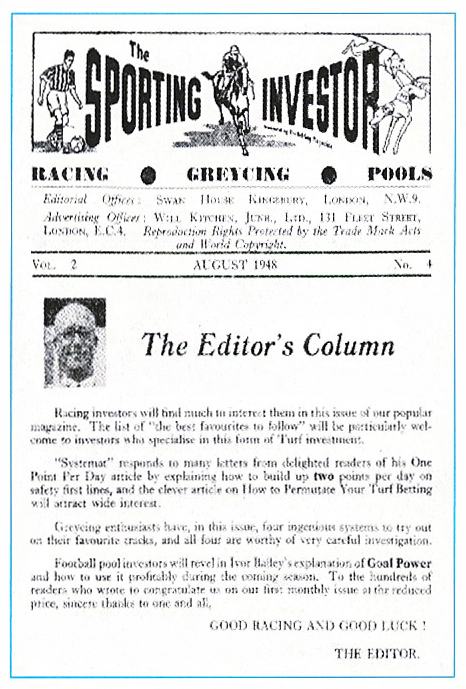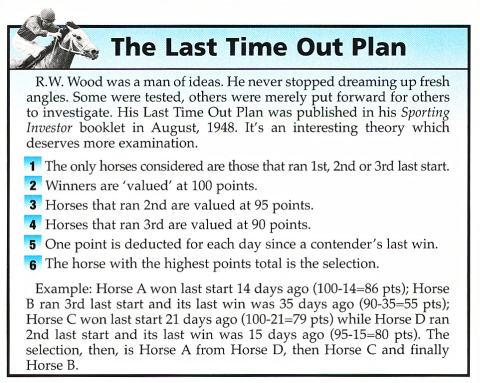Some 50 years ago, the name 'R.W. Wood' could be found on numerous racing books and booklets in Britain. He was perhaps the nation's best-known systems seller.
Today, the publications that bore his name are eagerly sought after by those people, like myself, who collect any book on racing which concerns itself with selection strategies, staking plans and the general psychology of betting.
Though R.W. Wood's name was well enough known, not much was known about the man himself. Half a century later, I thought the task of finding out exactly who he was would be an impossible task. Not so.
I was fortunate enough to contact, via an Internet horse-racing forum, an English professional punter who actually knew the legendary Mr Wood! He had the answer to the mystery I'd been unable to solve ever since the day I first laid hands on an R.W. Wood publication, an issue of his Sporting Investor weekly booklets, packed from cover to cover with betting ideas, systems and staking plans for horse-racing, greyhound racing and soccer.
The English pro told me: "He was my mathematics teacher at the local grammar school I attended. He also taught my father at the same school. I had no idea he was a punter but found out later when be was a customer of the betting shop in which I became the Saturday 'boy' at the age of 16.
"It's a surprise to find somebody I knew described as legendary. To me he was just a quiet, mild-mannered teacher; the sort of man that would earn the title schoolmaster, rather than schoolteacher. If you've ever seen the old black-and-white movie Mr Chips, with Robert Donat, you'll have the picture.
"He was known to us as Georgie Wood after a music hall comedian called Wee Georgie Wood.
This nickname was awarded in my father's time, before the war, in the early '30s. His wife also taught at the school but even on two salaries I doubt if lie ever had the capital to bet seriously.

"In those days you either had to go to the course or be wealthy enough to have a credit account.
There were no street bookies in the posh suburb where the school was located.
"So I guess it was mostly theoretical and reflected his love of maths, which was pretty much how I started, too, in my teens. When the betting shops were legalised in the 1960s, he was living on a pension and his bets were minimum stake as far as I remember."
Mr Wood's publications were many and varied. Some of what he wrote in those days (the '40s and '50s) can now be considered a little outdated, but much of it remains as pertinent to today's racing as it was back then. Like Pittsburgh Phil, and Eric Connolly, Mr Wood's writings stand the test of time very well indeed.
The old 'bets master' had a simple approach to what makes a successful punter. In his book Systematic Professional Betting, published in 1953, he wrote: "The secret of successful turf speculation lies in a sound working knowledge of what may be called the great fundamental systems.
"These must be understood and properly applied. It is not quite enough to know of any one good system and follow it through thick and thin. The shrewd backer has a grasp of the fundamental systems and he keeps them all working for him.
"In a sense, the backer is fighting a friendly little war against the bookmakers, but the forces against him are very powerful and he cannot afford to neglect any weapon that might help him to gain the victory. The backer with no knowledge whatever of scientific betting is fighting with bare fists against armoured columns!"
Mr Wood was adamant that correct application of various well thought-out systems would enable the punter to beat the bookmaker. He pointed out that bookmakers bet against the backers by systems, in the same way, the backer had to use systems to win.
"Plans based on betting forecasts, form figures, expert selections, starting-price favourites, and so on, can all be traced back to a small group of fundamentals, each of which is basically sound since each is based oil well-established facts and figures," he wrote.
"These fundamental systems enable anyone to predict what is likely to happen in the same way that a scientist say predict the weather, or in the same way that a statistician may predict the number of births and deaths that will occur during the next year.
"Insurance companies, which are nothing but betting organisations, use similar fundamentals when taking bets on human lives. Their tables enable them to predict the expectations of the life of any client. They can then reckon up what the client will pay in stakes (I beg pardon, premiums!) and how much they will pay in tile event of a client's death.
"Naturally, they won't bet oil you if you look like being a loser! Their systems are devised to exclude losing bets as far as possible. They make systematic betting pay because their betting is based on fundamental systems.
"When they bet you $100 to $2.50 a week in stakes they are betting that you will live long enough to pay them well over $100. But the point is they will not lay the odds if they do riot feel that the winning chance is in their favour. Without a knowledge of certain statistics and systems, they could riot carry on."
Mr Wood was at pains to warn the lazy punter of the moneyless road he was taking.
"The backer who leaves everything to chance is in no position at all," he said. "He might win occasionally but it's a certainty that he will lose in the end. On the other hand, the system backer is certain to end up with a winning balance if facts and figures mean anything."

In the first chapter of the book, Mr Wood expounded on his theories about the fundamentals of racing results and how they can be reasonably applied to future racing.
He said: "The careful study and analysis of racing results over a number of years has revealed the fact that certain averages of winners and losers tend to work out in almost similar ratio, season by season.
"It is as though the results are governed by certain fundamental laws rather than by mere chance, For instance, we find almost the same percentage of winning favourites each and every season, and if these are subdivided, the same percentages of winners for various types of races.
"Horses that won last time and those that were placed 2nd or 3rd, go on and win in a certain almost regular ratio year after year. So it is with horses quoted at various prices in the betting forecast: various prices produce various winning percentages.
“However, when we analyse racing results we find that they obey certain fundamental laws, and upon these laws the fundamental systems are established.”
Mr Wood was, of course, a great believer in the power of form. The intelligent backer, he wrote, never loses sight of the fact that form is the factor which largely determines results.
He went on: "There are certain uninformed backers who breezily declare that form doesn't matter, that it doesn't work out, that there is so much phoney business in the racing game that the whole thing is just a blind gamble”.
“All this is sheer nonsense. Sound public form is the thing that really matters. It is form that makes favourites and it is form that largely influences the handicapping when framing a race.”
NEXT MONTH: In Part 2 of this series, we look at more of R.W. Wood’s writings on betting and examine staking and selection plans.
Click here to read Part 2.
Click here to read Part 3.
By Brian Blackwell
PRACTICAL PUNTING - DECEMBER 2000